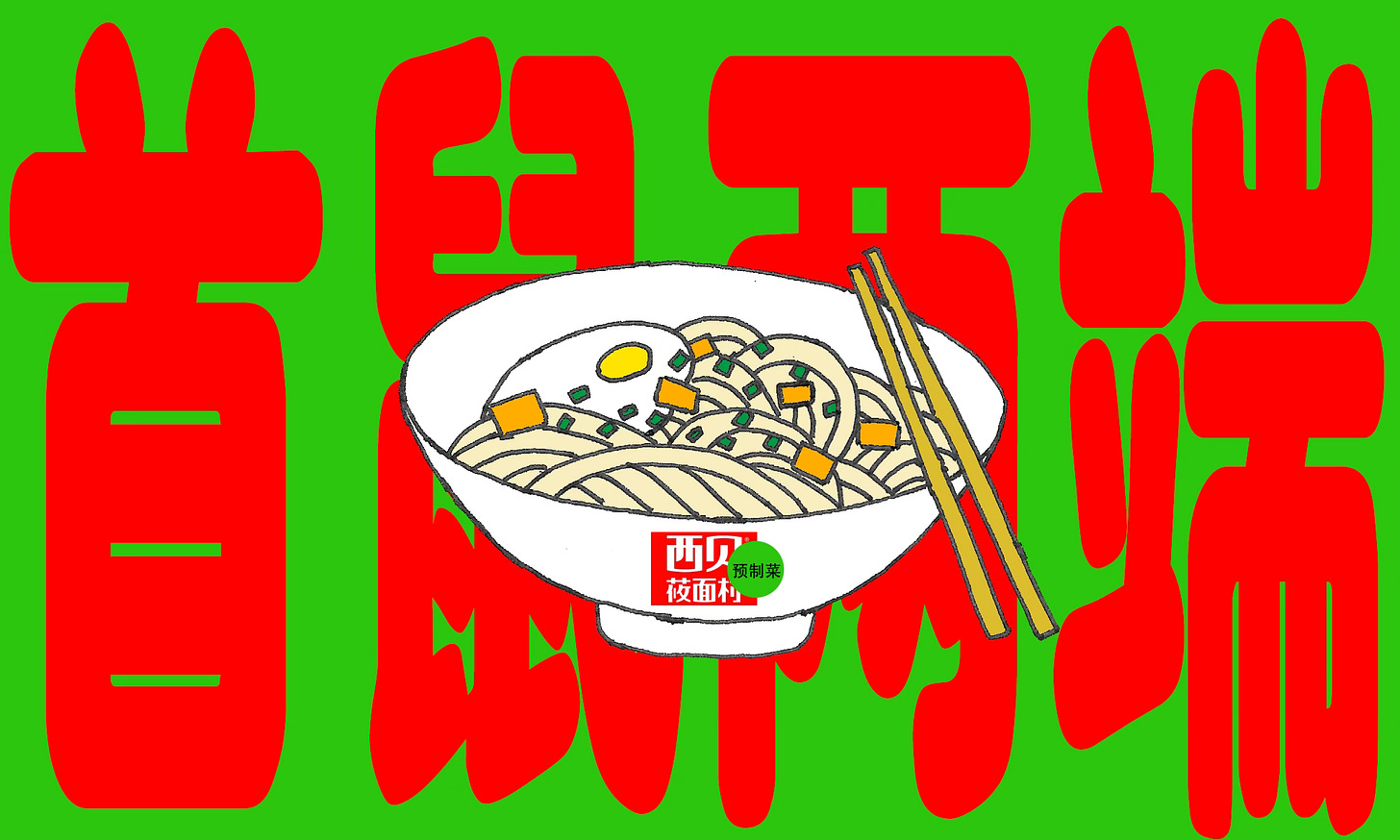"Trying to have it both ways" — Phrase of the Week
The Luo Yonghao vs. Xibei Pre-made Food Controversy

Our phrase of the week is: "Trying to have it both ways (首鼠两端 shǒushǔ liǎng duān)
Context
Popular restaurant chain Xibei (西贝) has been at the centre of a social media storm over the last week.
Xibei specialises in northwestern Chinese cuisine. As a premium casual dining brand, it charges higher prices for what it markets as high-quality, authentic dishes.
The controversy began on September 10th, when entrepreneur and social media influencer Luo Yonghao (罗永浩) posted on Weibo criticizing Xibei for serving almost all "pre-made food" (预制菜) at high prices, and called for legal requirements to label pre-made dishes.
Xibei founder Jia Guolong (贾国龙) rejected Luo's allegations and threatened legal action. The dispute escalated over the following days.
The clash highlights two big issues in China's food industry right now: the unclear definition of "pre-made food" (预制菜), and increasingly price-sensitive consumers.
Restaurant chains like Xibei argue their central kitchen model — where ingredients are pre-processed off-site then delivered to stores — is essential to maintain efficiency and keep costs low while maintaining freshness.
Customers, however, may see this as "pre-made" while also increasingly expecting high quality for low prices.
This creates a tension between customers and brands.
Xibei and others are leaning into the central kitchen model to keep prices competitive. But this puts them at odds with customer expectations on perceived quality and freshness:
Xibei finds itself caught in a dilemma: it craves the efficiency and profits brought by industrialization, yet clings to the narrative and premium pricing of "freshly made, freshly cooked."
But in today's era of radical transparency, its attempt to have it both ways looks increasingly untenable.
西贝的困境在于:它既想要工业化带来的效率和利润,又想要"现做现炒"的故事和溢价。在信息越发透明的今天,这种"首鼠两端"的策略注定难以维系!
Xībèi de kùnjìng zàiyú: tā jì xiǎngyào gōngyèhuà dàilái de xiàolǜ hé lìrùn, yòu xiǎngyào "xiàn zuò xiàn chǎo" de gùshì hé yìjià. Zài xìnxī yuèfā tòumíng de jīntiān, zhè zhǒng "shǒushǔ liǎng duān" de cèlüè zhùdìng nányǐ wéixì!
And with that, we have our Sinica Phrase of the Week.
What it means
"Trying to have it both ways" translates as "a wary rat moves forward and back when preparing to leave its hole " (首鼠两端 shǒushǔ liǎng duān) — unable to make up its mind.
The idiom originates from one of China's most important historical texts, the Records of the Grand Historian (史记) by Sima Qian (司马迁), completed around 94 BCE during the Western Han Dynasty.
Sima Qian is considered the father of Chinese historiography, and his comprehensive history covers events from the legendary Yellow Emperor through to the Han Dynasty.
The phrase appears in the Biographies of the Marquises of Weqi and Wu'an (魏其武安侯列传), which chronicles court intrigues and political rivalries during the reign of Emperor Wu:
"Wu'an had already left court and stopped at the carriage gate. He summoned Grand Secretary Han to ride with him and angrily said:
'You and I will deal with this bald old man together, so why were you hesitating like a wary rat preparing to leave its hole ?'"
"武安已罢朝,出止车门,召韩御史大夫载,怒曰:'与长孺共一老秃翁;何为首鼠两端?'"
Wǔ'ān yǐ bà cháo, chū zhǐ chē mén, zhāo Hán yùshǐ dàfū zài, nù yuē: 'Yǔ chángrú gòng yī lǎo tū wēng; hé wéi shǒushǔ liǎng duān?'
The Marquis of Wu'an, whose name was tian Fen (田蚡), was a powerful but corrupt Han Dynasty official. In this passage he is berating Grand Secretary Han Anguo (韩安国) for being indecisive during a court dispute. Tian Fen had expected Han's support against his political enemies, but Han tried to remain neutral by presenting both sides of the argument to the emperor.
Tian Fen angrily accused Han of behaving like a cautious rat as he hesitated with divided loyalty, attempting to avoid taking sides in a dangerous political conflict.
This historical reference evolved into the modern idiom, which can be translated as "wavering between two options", "sitting on the fence", or "trying to have it both ways".
Xibei is trying to cut its costs, while maintaining its high end brand, and high prices.
The restaurant chain can’t have it both ways.
Andrew Methven is the author of RealTime Mandarin, a resource which helps you bridge the gap to real-world fluency in Mandarin, stay informed about China, and communicate with confidence—all through weekly immersion in real news. Subscribe for free here.



